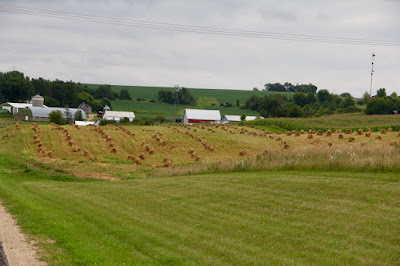This morning I received a very pleasant surprise, the work of one of my long time environmental heroes was cited in a very recent editorial in the Times of Storm Lake Iowa [Editorial: Reaching our limits]. After spending a number of paragraphs describing Iowa's agricultural pollution and its consequences, Art Cullen, the Storm Lake Times editor, notes:
This was all foreseen more than 70 years ago by native Iowan Aldo Leopold, who predicted that all our chemicals and engineering would destroy us as we destroyed the land. He suggested in a key 1949 essay, The Land Ethic, while at the University of Wisconsin that we develop conservation agriculture as our ethos. Everything he suggested came true: the rivers have lost their former lives, the soil is washing down them, and in dominating the landscape we diminish ourselves. He suggested that we live as citizens of the land rather than over it.
In the decades since we moved to Minnesota, we've observed a growing number of instances in which our adopted home has chosen to participate in races to the bottom with contenders such as Iowa. That's part of the problem resulting from the consolidation of economic, and consequently political, power.
 |
| agriculture in the Driftless Area
Photo by J. Harrington
|
A truism that's been with us since New Testament times is that “A prophet is not without honor except in his own country, among his own relatives, and in his own house.” Perhaps that helps explain why Leopold's Land Ethic [Aldo Leopold Foundation The Land Ethic] is not acknowledged and followed more in the restorative agriculture sector.
Unless we are missing a significant distinction between "ethic" and "ethics," which is all too possible, we would quibble with Leopold's thinking and writing when he asserts that “I have purposely presented the land ethic as a product of social evolution because nothing so important as an ethic is ever ‘written.’ Our experience with ethics has been in the context of the codes of conduct they articulate. For example, there's the Boone and Crockett Club's statement on hunter ethics and fair chase and Trout Unlimited's Code of Ethics. Maybe what we need is the broad, overarching Land Ethic from which we could derive an Agricultural Code of Ethics. What should that look like and encompass?
Ethics
In ethics class so many years ago
our teacher asked this question every fall:
if there were a fire in a museum
which would you save, a Rembrandt painting
or an old woman who hadn't many
years left anyhow? Restless on hard chairs
caring little for pictures or old age
we'd opt one year for life, the next for art
and always half-heartedly. Sometimes
the woman borrowed my grandmother's face
leaving her usual kitchen to wander
some drafty, half imagined museum.
One year, feeling clever, I replied
why not let the woman decide herself?
Linda, the teacher would report, eschews
the burdens of responsibility.
This fall in a real museum I stand
before a real Rembrandt, old woman,
or nearly so, myself. The colors
within this frame are darker than autumn,
darker even than winter — the browns of earth,
though earth's most radiant elements burn
through the canvas. I know now that woman
and painting and season are almost one
and all beyond saving by children.
********************************************
Thanks for visiting. Come again when you can.
Please be kind to each other while you can.
No comments:
Post a Comment